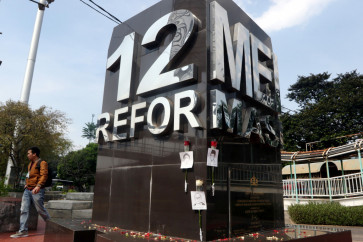Popular Reads
Top Results
Can't find what you're looking for?
View all search resultsPopular Reads
Top Results
Can't find what you're looking for?
View all search results24 years on, can we agree to realize a violence-free Indonesia?
There are, indeed, constant tensions between the youths aspiring for a change and the grown-ups aiming to preserve the status quo in Indonesian human rights history.
Change text size
Gift Premium Articles
to Anyone
A
lmost 77 years since independence and precisely 24 years after the Reform era, Indonesia's human rights history (or lack thereof) is filled with stories of tension. It is as if the respect, protection and fulfillment of basic human dignity are issues the nation cannot seem to agree on.
One of the strains that persistently emerge from time to time is between the youths and the grown-ups. On the one hand, the youths consistently demand justice and freedom, but on the other hand, the grown-ups look unfailingly reluctant (or even brazen) to embrace positive changes. Often, the youths are represented by students, while statespersons characterize the grown-ups.
During Sukarno's era, students organized the Tritura movement in 1966. Short for Tri Tuntutan Rakyat (Three Demands of the People), the Tritura movement was a response to Sukarno's “lighthouse politics” that prioritized confrontative foreign policies to improve Indonesia's international recognition, which, unfortunately, and in turn, brought adverse impacts to the domestic economy. Students, thus, demanded that Sukarno reshuffle his Cabinet and lower the prices of basic needs, among other ultimatums.
Unwilling to bow down altogether to the people's demands, Sukarno reacted forcefully. First, he deployed the Cakrabirawa Regiment, an elite presidential detail, to curb rally participants, which led to the fatal shooting of a medical student, Arif Rahman Hakim. Secondly, Sukarno disbanded a student organization he accused of being a “provocateur”, the Indonesia Students Action Forum (KAMI).
Thirdly, Sukarno signed the Order of March 11 (Supersemar), which ordered then-Army commander Soeharto and the military to restore “national order”. Ironically, Supersemar was used by the latter to delegitimize the former from the presidential position and began the Soeharto-led authoritarian New Order regime.
The New Order regime encountered its first youth-initiated protest in January 1974. The Malari protest, short for Malapetaka Lima Belas Januari (Jan. 15 Catastrophe), was started by students and young activists to demand, among other things, lower prices and corruption eradication.
Nevertheless, for reasons and by means similar to his predecessor, Soeharto responded with muscle. Reports state that the excessive use of force claimed 11 lives, wounded 130 to 300 civilians and led to the arbitrary arrest of between 750 and 775 people, including the late human rights activist and lawyer Adnan Buyung Nasution.



















